Businesses generate significant expenses that can be challenging to track. If combined with poor bookkeeping, this can make running your business more complicated than needed. But there's another reason you need to organize your business expenses: figuring out your tax deductions.
To reap the benefits of business tax write-offs, you must account for all the business expenses incurred by your company. Then, you can deduct these expenses from your income, lowering your tax liability. But where does one start?
This article covers everything you need to know about business expenses–categorizing them, which ones are tax-deductible, and why you need business expense categories. In addition, it is a good starting point to understand how to organize your spending to maximize your tax deductions.
What Are Tax-Deductible Business Expenses?

A tax-deductible business expense is any cost incurred by an organization that can be subtracted from its taxable income, thereby reducing its tax liability. These expenses must be ordinary, necessary, and reasonable for the business to operate. An ordinary expense is common and accepted in your industry, while a necessary expense is helpful and appropriate for your business.
Some examples of tax-deductible business expenses include:
- Salaries and wages paid to employees
- Rent or lease payments for business premises
- Utilities such as electricity, water, and internet
- Depreciation on business assets such as equipment and vehicles
- Interest on business loans
- Taxes and licenses related to business operations
Now, which expenses may be written off will vary depending on the nature of your business. You can start by reviewing IRS Publication 535, which talks about the deductibility of business expenses and the general rules around tax filing.
The IRS also recommends distinguishing between usual business expenses and those that fall under Cost of Goods Sold (COGS) and capital expenditures to ensure accuracy, as some business expenses cannot be deducted in the year they were made.
What Are Business Expense Categories?
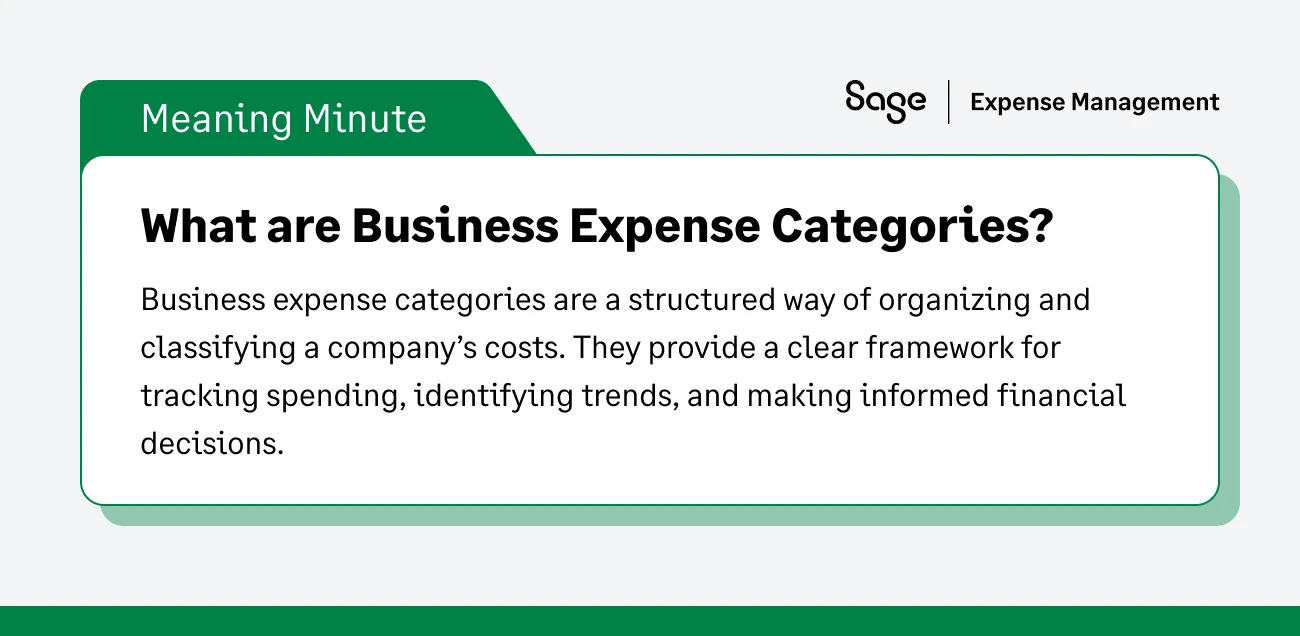
Business expense categories are a structured way of organizing and classifying a company's costs. They provide a clear framework for tracking spending, identifying trends, and making informed financial decisions.
Why Do You Need Business Expense Categories?
The IRS defines business expenses as "the costs of carrying on a trade or business."
Running a business means tracking expenses across departments, projects, cost centers, individuals, and more. This could be a daunting experience. But if not sorted, these business expenses can become an absolute nightmare once tax season rolls around.
Dividing your expenses by category can help maximize your tax deductions. For example, some business expenses are tax-deductible, so knowing which class each expense falls into enables you to ensure you take advantage of all the deductions.
What's more? Having business expense categories can:
- Provide insight into what, where, and why money is spent
- Enable data-driven decisions around budgeting and cost optimizations
- Document and organize spending plans specifically for investors or lenders
- Provide a bird's-eye view of historical, current, and future spend across different expense categories
While doing this manually can hurt your business with manual errors and slips, sorting your expenses into categories doesn’t have to be complicated. You can simply use an expense management software. This doesn't just make it a one-click process but also gathers, interprets, and guides business owners and finance teams to keep track of their business expenses and deductibles.
41 Essential Business Expense Categories
If you’re making a list of business expense categories for the first time or simply need a reminder, here are the most common types you might want to include:
1. Utilities
The good news for those renting or owning a commercial space for their business is that the utilities are generally fully deductible as business expenses. Utilities often include expenses like electricity, water, internet, phone, sewage, and trash pickup. Remember, if part of the utility expense is for personal use (like in a home office), only the business portion is deductible.
2. Rent or Mortgage Costs
If you’re paying rent for the office space, you’re likely eligible for a tax deduction on the interest rate. The same applies to mortgage costs. Mortgage interest on real estate you own is generally deductible. However, under certain circumstances, you may need to capitalize the interest instead of deducting it immediately.
All these costs fall under the category of occupancy expenses, which are costs related to the operation of your business. Other occupancy expenses include property taxes, insurance, and office space repairs and maintenance.
Be sure to keep track of all your rental or mortgage loan payments throughout the year and of any other associated costs so that you can accurately report them on your tax return.
3. Office Supplies and Office Assets
Office supplies, such as stationery, cleaning supplies, paper towels, etc., actually consumed and used during the tax year can generally be deducted. If you keep incidental supplies on hand and don't track inventory or usage precisely, you can often deduct the cost of supplies purchased during the year if the method doesn't distort income.
Office assets encompass a wide range of items, including land, buildings, machinery, furniture, trucks, patents, and franchise rights. The entire cost of acquiring these assets, including freight and installation charges, must generally be capitalized, meaning the cost is recovered over time through depreciation or amortization, rather than being deducted in the year of purchase.
Certain property you produce for use in your trade or business must also be capitalized under the uniform capitalization rules. However, a de minimis safe harbor election may allow you to deduct smaller asset purchases currently.
(See IRS Regulations section 1.263A-2 for information on these rules. )
4. Bank Fees and Credit Card Charges
Ordinary and necessary bank fees charged on your business accounts are deductible. This includes monthly maintenance fees, fees for specific transactions (like wire transfers related to business), and fees for services like overdraft protection on a business account. Credit card processing fees paid by the business are also deductible.
5. Website Expenses
Costs associated with creating and maintaining a business website are deductible. This includes expenses like:
- Domain name registration fees
- Web hosting fees
- Fees paid to web designers and developers for creating or updating the site.
- Costs for website themes or templates.
- Fees for SSL certificates.
- Costs for website maintenance services.
Note: Significant costs incurred in creating a website, especially before business operations begin, might need to be treated as startup costs and amortized rather than deducted immediately.
6. Software Expenses
The cost of software used for business purposes is generally deductible. This includes purchasing off-the-shelf software, subscription fees for cloud-based software (SaaS), and potentially the costs associated with developing software (though development costs may need to be amortized).
Examples include accounting software, CRM systems, project management tools, and industry-specific software. If software is used for both business and personal reasons, only the business-use portion is deductible. Software bundled with hardware and not separately priced might be treated as part of the hardware cost.
7. Printing Expenses
Self-employed individuals can get a tax deduction on printing expenses necessary to run their business. This includes the cost of paper, ink, and other supplies used for printing business-related documents. Additionally, self-employed workers can deduct the cost of repairs and maintenance for printers and other office equipment.
8. Postage And Shipping
Costs for postage, freight-in (on goods acquired for resale or raw materials), and shipping supplies used in your business are deductible. This includes the cost of mailing invoices, business correspondence, shipping products to customers, and postage for marketing materials. Packaging materials may be deductible as supplies.
9. Employee Salaries
Business owners can deduct the salaries of their employees as a business expense. This deduction also includes any bonuses, wages, commissions, or other non-cash compensation, such as vacation allowances or fringe benefits, paid to workers.
Keep in mind that in order to be deductible, your employees’ pay must be reasonable and necessary for conducting business to qualify for a deduction. The pay must also satisfy the following tests:
- Test 1. It must be reasonable.
- Test 2. It must be for services performed.
Test 1 - Reasonable
Factors to consider to determine whether the pay is reasonable:
- Job Duties: The nature and complexity of the work performed.
- Workload: The volume of work handled and the level of responsibility.
- Business Complexity: The intricacy and demands of the business operations.
- Time Commitment: The amount of time dedicated to the role.
- Cost of Living: The prevailing living expenses in the area.
- Employee Performance: The individual employee's skills, experience, and accomplishments.
- Compensation Equity: The employee's pay relative to the company's overall profitability and shareholder distributions.
- Company Pay Policy: The established pay structure and compensation guidelines for all employees.
- Pay History: The individual employee's salary progression over time.
Test 2 - For Services Performed
You must be able to prove that the payments were made for services that were actually performed.
10. Employee Training and Education
Expenses paid for the education and training of your employees are generally deductible if they maintain or improve skills required for their jobs within your business. This includes costs for courses, seminars, and in-house training programs.
Reimbursements to employees for qualifying education expenses under a qualified educational assistance program are also deductible. Education that meets minimum job requirements or qualifies the employee for a new trade or business is generally not deductible.
11. Employee Benefit Programs
You can deduct amounts you spend on employee benefit programs, which can include accident and health plans, adoption assistance, dependent care assistance, and life insurance coverage (provided you are not the beneficiary).
12. Employee Reimbursements

You can generally deduct the amount you reimburse employees for business expenses. How you deduct these expenses depends on whether you have an accountable plan or a non-accountable plan.
- An accountable plan requires employees to substantiate their expenses and return any excess reimbursement within a reasonable period of time. Under this plan, reimbursements are not considered taxable wages.
- A non-accountable plan is any plan that doesn't meet these requirements. In this case, all reimbursements are treated as taxable wages and are reported on Form W-2.
Also Read
13. Work Opportunity Tax Credit (WOTC)
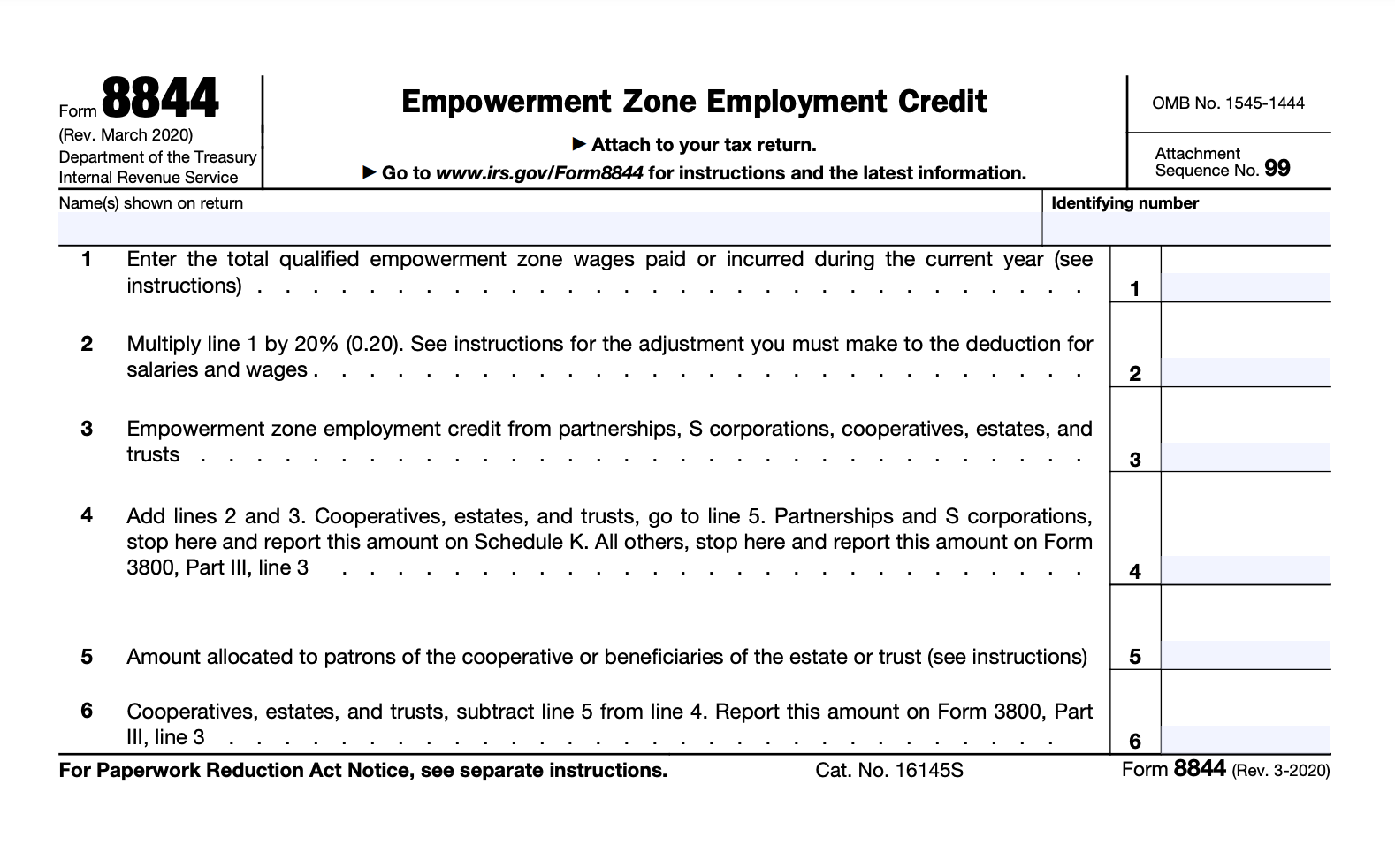
The Work Opportunity Tax Credit (WOTC) is a federal tax credit available to employers who hire individuals from certain targeted groups who have faced significant barriers to employment. Some of these groups include:
- Veterans
- Recipients of Supplemental Nutrition Assistance Program (SNAP) benefits
- Recipients of Supplemental Security Income (SSI) benefits
- Young people ages 16-24 who are not in school or working
- Ex-felons
You can claim a credit of up to $2,400 for each eligible employee you hire. The credit is equal to 40% of the first $6,000 of qualified wages paid to or incurred on behalf of an individual who:
- Are in their first year of employment;
- Are certified as being a member of a targeted group; and
- Perform at least 400 hours of services for that employer
14. Employer Credit for Paid Family and Medical Leave
The Employer Credit for Paid Family and Medical Leave is a federal tax credit available to employers who provide paid family and medical leave to their employees.
The credit is equal to 100% of the wages paid to eligible employees on leave, up to a maximum of $5,112 per employee per year.
Note: The credit is effective for wages paid in taxable years beginning after December 31, 2017, and before January 1, 2026.
15. Business Trip Expenses
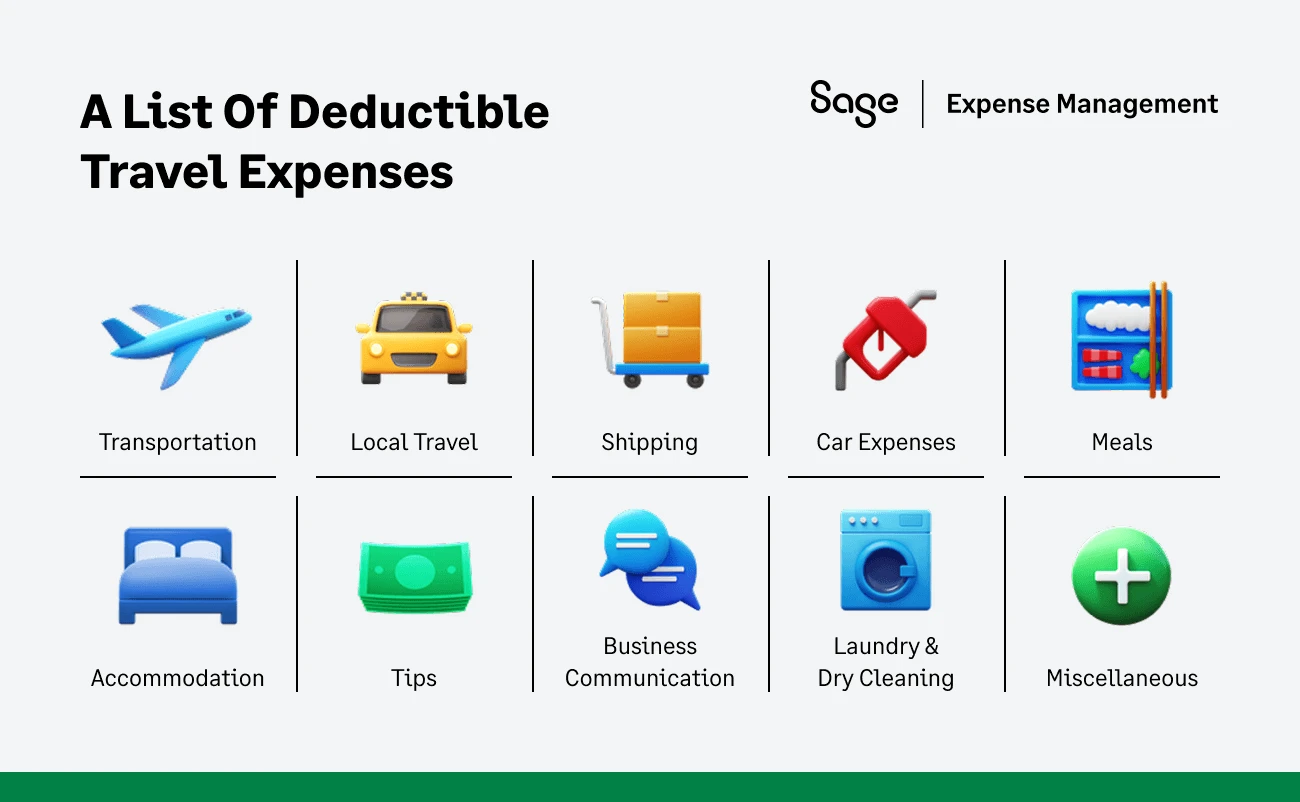
Business travel expenses are tax-deductible, but the IRS has strict rules about what qualifies. The travel must be away from your tax home (your regular place of business) substantially longer than an ordinary workday, requiring sleep or rest.
The trip’s primary purpose must be business-related, such as meeting clients, attending conferences, or employee training. If a trip combines business and personal activities, only the business-related portion of expenses is deductible. Deductible costs can include transportation (flights, train, bus, car), lodging, and meals.
Remember that meal expenses are generally only 50% deductible. Detailed records proving the amount, time, place, and business purpose are crucial.

16. Business Gifts
You can deduct the cost of gifts given to clients, customers, or employees, but the deduction is limited to $25 per recipient per year. Gifts to a company intended for specific individuals count towards this limit for those individuals.
Incidental costs like packaging, engraving, or mailing generally don't count towards the $25 limit unless they add substantial value. Promotional items costing $4 or less with your name permanently imprinted, and items like signs or display racks for the recipient's business premises, are exceptions and not subject to the $25 limit. Keep records showing the cost, date, description, business purpose, and business relationship of the recipient.
17. Car Expenses (Standard Mileage vs. Actual Costs)
When using a car for business, you have two primary options for calculating your deductible expenses: the standard mileage rate or actual car expenses.
- Standard Mileage Rate: For 2026, the rate is 72.5 cents per mile. This method is a simplified way to track car expenses, but if you choose it, you cannot deduct actual expenses, such as gas, repairs, and insurance.
- Actual Car Expenses: This method requires you to track all costs associated with your vehicle, including gas, oil, repairs, insurance, and depreciation. You can then deduct the portion of these expenses that is directly related to business use, based on the percentage of business miles driven.
The IRS requires adequate records to prove your car's business use, including a log of business mileage, dates, destinations, and business purpose.
Also Read
18. Depreciation
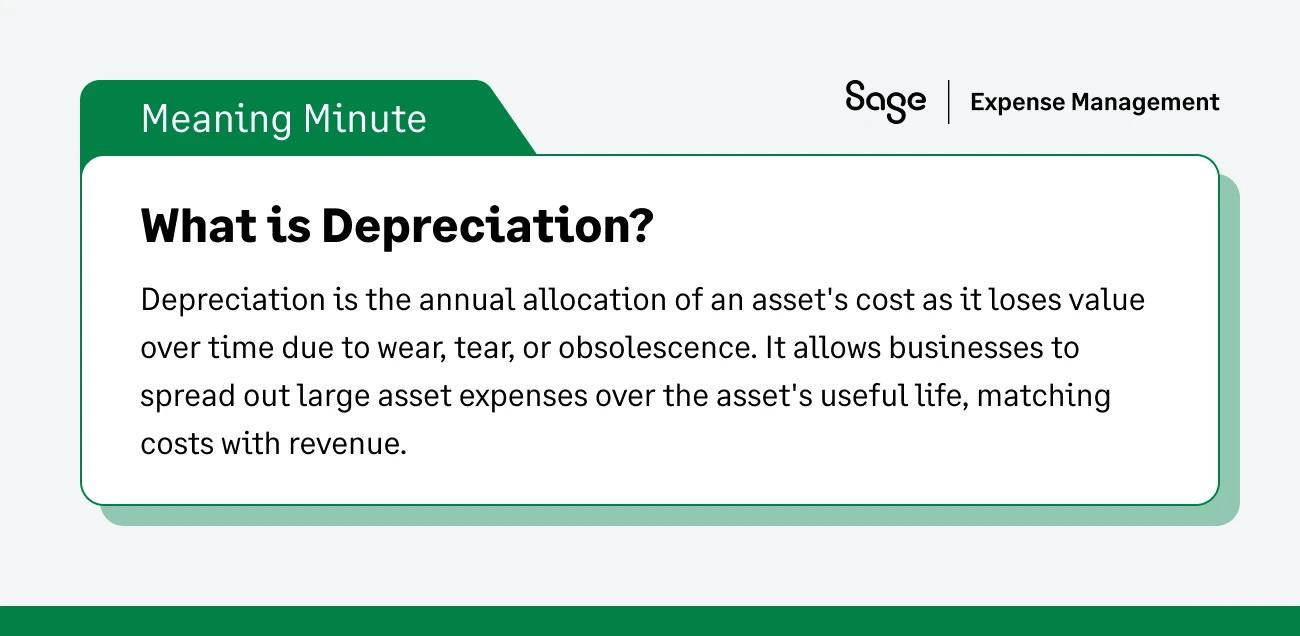
Depreciation is a fundamental concept for businesses that own tangible assets expected to last more than one year. Instead of deducting the full purchase price immediately, depreciation allows you to systematically deduct portions of the asset's cost over its predetermined useful life or "recovery period." Think of it as accounting for the wear and tear or obsolescence of your business property over time.
Here's a breakdown of key points regarding depreciation:
- What Qualifies for Depreciation? Depreciation applies to tangible assets you own and use in your business or hold to produce income, such as buildings, machinery, equipment, furniture, and vehicles. The property must have a determinable useful life, meaning it wears out or loses value. Land itself cannot be depreciated. Inventory held for sale is also not depreciated.
- Purpose: It's the method for recovering the cost of assets that provide value to your business for longer than a single tax year.
- Depreciation System (MACRS): The primary method used for most property placed in service after 1986 is the Modified Accelerated Cost Recovery System (MACRS). MACRS assigns assets to specific property classes with defined recovery periods.
- Section 179 Deduction: This allows businesses to elect to treat the cost (or part of the cost) of certain qualifying property as an expense and deduct it in the year the property is placed in service, subject to dollar limits and business income limitations. This is an alternative to recovering the cost via yearly depreciation deductions.
- Special (Bonus) Depreciation Allowance: For certain qualified property (often new, but sometimes used, assets acquired and placed in service by certain dates), businesses may be able to claim an additional first-year depreciation deduction. The percentage for this allowance is currently phasing down (it was 100% for certain property, then 80%, and is 60% for property placed in service in 2024).
- Form 4562: This is the primary IRS form used to calculate and report depreciation deductions, including the Section 179 deduction and the special depreciation allowance.
- Listed Property: Special rules and stricter recordkeeping requirements apply to "listed property," which includes assets like passenger automobiles and property generally used for entertainment or recreation, due to their potential for personal use. For these assets, claiming depreciation often requires proving that business use exceeds 50%.
Calculating depreciation can be complex, involving factors like the asset's basis, the date it was placed in service, the applicable depreciation method, and the recovery period. Consulting IRS Publication 946, How to Depreciate Property, is highly recommended for detailed guidance.
19. Legal And Professional Expenses
Fees paid to professionals like lawyers, accountants, consultants, and tax preparers are deductible if they are ordinary and necessary expenses directly related to operating your business. This includes fees for tax advice and preparation of the business-related parts of your tax return.
Fees paid to acquire business assets or for work of a personal nature (like drafting a personal will) are generally not deductible as business expenses; acquisition costs are added to the asset's basis.
20. Taxes (Other than Business Taxes)
Beyond income, employment, property, and sales taxes already mentioned, other taxes directly attributable to your trade or business are deductible. This can include:
- Federal excise taxes (unless part of the cost of fuel or other items).
- State or local franchise taxes.
- Occupational taxes charged by a locality for the privilege of conducting business.
21. Business Insurance
Liability insurance, worker's compensation, disability, and other business-related insurance are deductible. However, commercial auto insurance is a bit more complex; if you use the vehicle solely for commuting, it doesn't count as a business expense. On the other hand, driving the car for business reasons but still using it for personal purposes will likely grant you a partial tax deduction.
Listed below are some other deductions you can make for premiums if you pay for the following kinds of insurance:
- Property and casualty insurance: Covers losses due to fire, theft, accidents, or other unforeseen events.
- Credit insurance: Protects against losses arising from unpaid customer debts.
- Health and medical insurance: Covers employees' medical expenses, including long-term care. For partnerships, premiums paid for partners are deductible as guaranteed payments.
- Liability insurance: Safeguards against legal claims resulting from damages or injuries caused by your business activities.
- Malpractice insurance: Protects healthcare professionals against claims of professional negligence leading to patient harm.
- Workers' compensation insurance: Mandatory insurance that covers employee injuries or illnesses arising from work-related activities.
- Unemployment insurance contributions: Deductible if considered taxes under state law.
- Overhead insurance: Covers business expenses incurred during prolonged disability due to personal injury or illness.
- Vehicle insurance: Covers business vehicles for liability, damages, and other losses. If a vehicle serves both personal and business purposes, only the portion attributed to business use is deductible. If using the standard mileage rate for vehicle expenses, no insurance premium deduction is allowed.
- Life insurance: Deductible if covering officers or employees, provided you are not a direct or indirect beneficiary.
- Business interruption insurance: Compensates for lost profits due to temporary business disruptions.
22. Bank Service Charges
Beyond general bank fees (#4), this can include specific service charges like fees for check printing, stop-payment orders on business checks, wire transfer fees for business payments, and fees for maintaining a business line of credit. Interest paid on a business line of credit is deductible as interest expense.
23. Internet Expenses
The cost of internet service used for your business is a deductible utility expense. If you have internet service at your business location, the entire cost is generally deductible. If you work from a home office and use the same internet service for both business and personal use, you must allocate the cost and deduct only the portion attributable to business use.
24. Continuing Education
This includes courses you take for continuing education or seminars designed to stay current with changing industry trends. All materials, books, and registration fees made for you and your employees are tax-deductible. Additionally, you can also deduct payments made to employees to reimburse them for relevant educational purposes.
These payments can be deducted if they are part of a qualified educational assistance program. You can deduct them on the “Employee benefit programs” or any other appropriate line of your tax return.
25. Dues And Subscriptions Expense
You can deduct dues paid to professional organizations and trade associations related to your business (like bar associations or medical associations). Subscriptions to professional, technical, and trade journals that deal with your business field are also deductible.
However, dues paid to clubs organized for business, pleasure, recreation, or other social purposes (like country clubs, golf clubs, or airline clubs) are generally not deductible.
26. Credit And Collection Fees
If you use the accrual method of accounting and have accounts receivable (amounts owed by customers that you previously included in income) that become uncollectible, you can deduct them as bad debts. You must be able to demonstrate that the debt is worthless and you've taken reasonable steps to collect it.
Costs incurred in attempting to collect a business debt, such as hiring a collection agency, can also be deductible business expenses. Cash-method taxpayers generally cannot deduct uncollected amounts because they were never included in income.
27. Medical Expenses
Self-employed individuals (sole proprietors, partners, and >2% S-corp shareholders) can generally deduct premiums paid for medical, dental, and qualified long-term care insurance for themselves, their spouse, and dependents (including children under 27) as an adjustment to income. This deduction is taken on Schedule 1 (Form 1040), not Schedule C.
The deduction is limited to the net profit from the business under which the plan is established and cannot be claimed for any month the individual was eligible for an employer-subsidized health plan.
28. Licenses And Permits
Fees paid to state or local governments for licenses and permits required to operate your trade or business are deductible. This includes annual renewals. Significant costs for licenses granting rights over a longer period may need to be amortized.
29. Maintenance And Repairs
Keeping your business property and equipment in good working order often involves maintenance and repair costs, which can be important deductions. The key is distinguishing between currently deductible repairs and capital improvements, which must be depreciated over time.
Deductible Repairs
Routine maintenance and repairs that keep your property in a normal, efficient operating condition but don't significantly add to its value or substantially prolong its useful life are generally deductible in the year you incur the cost. Think of these as keeping things running smoothly, not fundamentally changing them. Examples include:
- Repainting the interior or exterior walls of a building.
- Fixing plumbing leaks (but not replacing entire fixtures).
- Repairing broken window panes.
- Replacing worn-out minor parts of machinery to maintain its condition.
- Reconditioning floors (but not replacing them).
- Cleaning and minor repairs to roofs and gutters.
- Changing the oil or other fluids in business equipment or vehicles.
Capital Improvements
Costs that result in a betterment to the property, restore it to like-new condition after deterioration, or adapt it to a new or different use generally must be capitalized and recovered through depreciation. Examples include:
- Replacing an entire roof.
- Rewiring or replumbing a building.
- Putting an addition on your building.
- Overhauling machinery to increase its production output or significantly extend its life.
- Strengthening a building's foundation for a new purpose.
Vehicle Maintenance
For businesses using vehicles, you can deduct the business-use portion of actual maintenance and repair costs if you use the actual expense method. This includes expenses for gas, oil, tires, general repairs, tune-ups, etc.. If you opt for the standard mileage rate, these maintenance and repair costs are already factored into the rate and cannot be deducted separately.
Recordkeeping
Remember to keep detailed records and receipts for all maintenance and repair work, clearly documenting what was done, the cost, and the date. This documentation is essential to support your deductions.
30. Telephone
The cost of telephone service for your business is deductible. If you have a dedicated business line, the full cost is deductible. For the first landline in your home, even if used partly for business purposes, you cannot deduct the basic local service charge. However, you can deduct business-related long-distance charges and the cost of a second line used exclusively for business. The business-use portion of cell phone costs is also deductible.
31. Startup Expenses
Getting a new business off the ground involves various costs incurred before you officially open your doors or begin active operations. These pre-opening expenses fall into two main categories: startup costs and organizational costs. The IRS allows you to deduct a portion of these costs immediately and amortize (deduct over time) the rest.
What are Startup Costs?
These are costs paid or incurred for either:
- Creating an active trade or business.
- Investigating the creation or acquisition of an active trade or business.
What are Organizational Costs?
These are costs specifically related to forming a corporation or a partnership.
Deductibility Rules for Startup Expenses
Generally, these are capital expenses. However, you can elect to:
- Deduct up to $5,000 in business startup costs AND
- Deduct up to $5,000 in organizational costs
- This deduction applies to the tax year in which your active trade or business begins.
- Important Limit: The $5,000 deduction for each category is reduced (dollar-for-dollar) by the amount your total startup or organizational costs exceed $50,000, respectively.
- Any remaining costs above the initial $5,000 deduction must be amortized (deducted in equal parts) over 180 months (15 years), starting with the month the business begins.
Qualifying Startup Costs
To qualify for the deduction/amortization, a startup cost must meet both these tests:
- It would be deductible if paid or incurred to operate an existing active trade or business in the same field.
- It is paid or incurred before the day your active trade or business begins.
Examples of Deductible Startup Costs Include
- Market Research: Analysis or surveys of potential markets, products, labor supply, transportation facilities, etc.
- Opening Promotion: Advertising for the business's launch.
- Employee Training: Salaries and wages for employees being trained before opening, and their instructors.
- Business Development: Travel and other necessary costs to secure prospective distributors, suppliers, or customers.
- Professional Services: Salaries and fees for executives, consultants, legal, and accounting services related to starting the business.

Costs NOT Considered Startup Costs
Deductible interest, taxes, and research & experimental costs are not treated as startup costs and follow their own deduction rules.
Investigating vs. Acquiring
Costs incurred during a general search or preliminary investigation of whether to create or purchase a business qualify as startup costs. However, costs incurred in the attempt to acquire a specific business (like drafting purchase agreements after deciding to buy) are capital expenses related to the acquisition and cannot be deducted/amortized as startup costs.
Remember to make the election to deduct/amortize these costs on the tax return for the year your business begins active operations. Form 4562 is used for amortization. Consult IRS Publication 535 for full details on startup and organizational costs.
32. Depletion
If your business involves extracting natural resources, such as minerals, oil, gas, or timber, you can deduct depletion. Depletion is similar to depreciation but applies to natural resources. It accounts for the use up (depletion) of the resource. There are two methods: cost depletion and percentage depletion. The method yielding the larger deduction is generally used.
33. Amortization
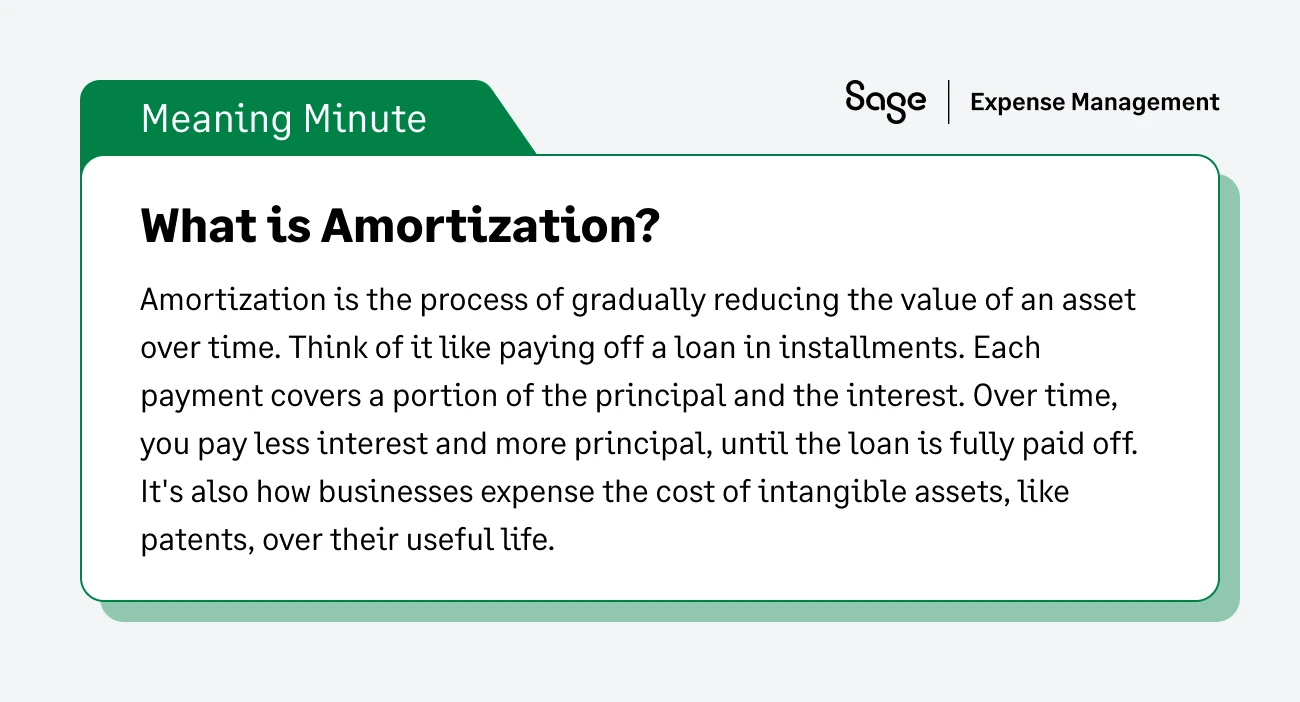
Amortization is the method for deducting the capitalized cost of certain intangible assets over a set period, usually straight-line. Besides startup/organizational costs, this applies to acquired Section 197 intangibles (like goodwill, patents, copyrights, customer lists, and franchises), costs of getting a lease, and pollution control facilities.
The amortization period is often 15 years for Section 197 intangibles.
34. Bad Debts (Non-Credit Sale Related)
A business bad debt is a loss resulting from a debt that becomes worthless and arises from your trade or business. This is distinct from bad debts from credit sales. A business bad debt can result from loans made to clients, suppliers, or employees for business reasons. You must show that the debt is worthless and you've taken reasonable steps to collect it.
35. Moving Expenses (Business Assets vs. Personal Relocation)
It's important to distinguish between two types of "moving" expenses, as their deductibility differs significantly:
Moving Business Assets
If you move business machinery, equipment, or inventory from one business location to another, the costs associated with this move are generally deductible business expenses. This can include the costs of dismantling, transporting, and reinstalling the items at the new location. However, costs related to moving and installing newly purchased machinery are typically capitalized as part of the asset's cost, rather than being deducted immediately.
Personal Moving Expenses for Work
The deduction for personal moving expenses—the costs incurred when an individual relocates their home for reasons related to starting a new job or changing job locations—is generally suspended for most taxpayers for tax years 2018 through 2025 due to the Tax Cuts and Jobs Act. This means that even if you, as a sole proprietor, move your residence primarily because of your business location, you likely cannot deduct those personal moving costs on your federal return during this period.
Exception for Military
A key exception exists for members of the U.S. Armed Forces on active duty who move pursuant to a military order and incident to a permanent change of station. They may still be able to deduct their unreimbursed personal moving expenses.
36. Charitable Contributions (Business Context)
While direct charitable contributions made by a sole proprietorship are generally taken as personal itemized deductions (if eligible) on Schedule A, payments made to charitable or other organizations might be deductible as business expenses if they bear a direct relationship to your business and you can reasonably expect a financial return commensurate with the amount paid.
For example, sponsoring a table at a charity event where you prominently advertise your business might qualify as an advertising expense rather than a charitable contribution. Corporate charitable contributions have specific rules.
37. Child And/Or Dependent Care
While personal childcare costs are generally not a business deduction on Schedule C, if you, as an employer, pay for or provide qualified childcare facilities or services for your employees, these costs can be deductible business expenses. You might also be eligible for the Employer Credit for Employer-Provided Childcare Facilities and Services using Form 8882.
38. Employee Benefit Programs (Other than Health/Pension)
Beyond health insurance (#8) and retirement plans (#37), costs for other qualified employee benefit programs are deductible. Examples include:
- Group-term life insurance premiums (up to $50,000 coverage per employee, generally).
- Adoption assistance programs.
- Dependent care assistance programs (within limits).
- Contributions to welfare benefit funds (subject to limits).
39. Marketing Expenses
Reasonable advertising expenses directly related to your business activities are generally deductible. This includes costs for online ads, print media, commercials, and other promotional efforts. You can also usually deduct the cost of institutional or goodwill advertising aimed at keeping your business name before the public, provided it relates to business you reasonably expect to gain in the future. Costs associated with influencing legislation (lobbying) are generally not deductible.
40. Foreign Earned Income
If your business operates internationally, you may incur foreign taxes. Foreign income taxes paid or accrued can generally be taken either as a deduction against business income or as a foreign tax credit (often more beneficial), subject to limitations. Foreign real property taxes paid on business property located abroad are deductible. Other foreign taxes directly attributable to your trade or business may also be deductible.
For more details on these, see Publication 54. For information on the foreign tax credit, see Publication 514.
41. Manufacturing Or Raw Materials
This category (distinct from office supplies) covers the cost of raw materials that become part of a product you manufacture or sell, and supplies consumed directly in the production process or in providing services.
If inventory accounting is required, these costs are typically included in the Cost of Goods Sold calculation. If inventory accounting isn't required (e.g., small business taxpayer exception), costs are deducted when the materials/supplies are used or consumed.
For more information, see Cost of goods sold—chapter 6 of Pub. 334.
How To Categorize Expenses for Your SMB or Startup
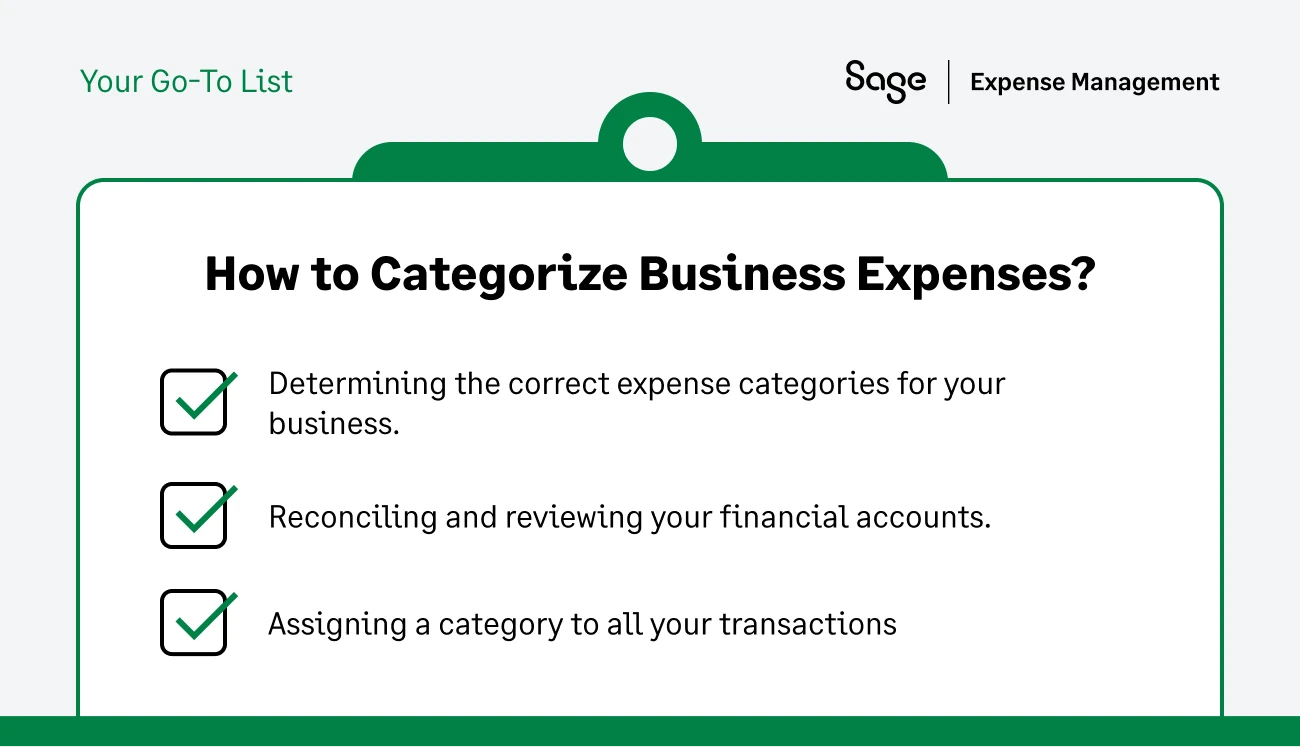
You can categorize your business expenses in three easy steps:
- Determining the correct expense categories for your business
- Reconciling and reviewing your financial accounts
- Assigning a category to all your transactions
Let’s look at each step in greater detail:
Step 1: Determine Expense Categories For Your Business
Your expense categories will vary depending on your industry. For instance, an online store may have dedicated business expense categories for storage and shipping while a SaaS organization may have for digital services.
For starters, identify the expense categories your organization uses the most–use a financial statement for reference here, or even the list above to help you.
Step 2: Reconcile And Review Your Financial Accounts Regularly
Regularly reviewing your financial accounts can help you maintain control over your business expenses. You can use an accounting tool or an expense management software to simplify your bank or credit card reconciliation process.
Some businesses opt for a business-only credit card to help them manage expenses better.
Step 3: Assign A Category To All Transactions
Once you have a list of all the categories, look at all your current business spending and assign all deductible expenses. Remember to make note of all deductions where receipts are required.
Step 4: Keep a Digital, Audit-Ready Trail for All Receipts
For a business expense to be deductible, you must be able to prove it with adequate records. The IRS considers a receipt to be "adequate" if it includes the vendor's name, the date of purchase, an item description, and the amount paid.
Manual processes, like saving paper receipts or emailing them to yourself, make it nearly impossible to keep track of every expense and its associated receipt. An automated expense management solution can digitize all receipts and automatically attach them to the correct transactions, creating a secure and centralized audit trail that’s always ready for tax season.
The Problems with Manual Expense Categorization
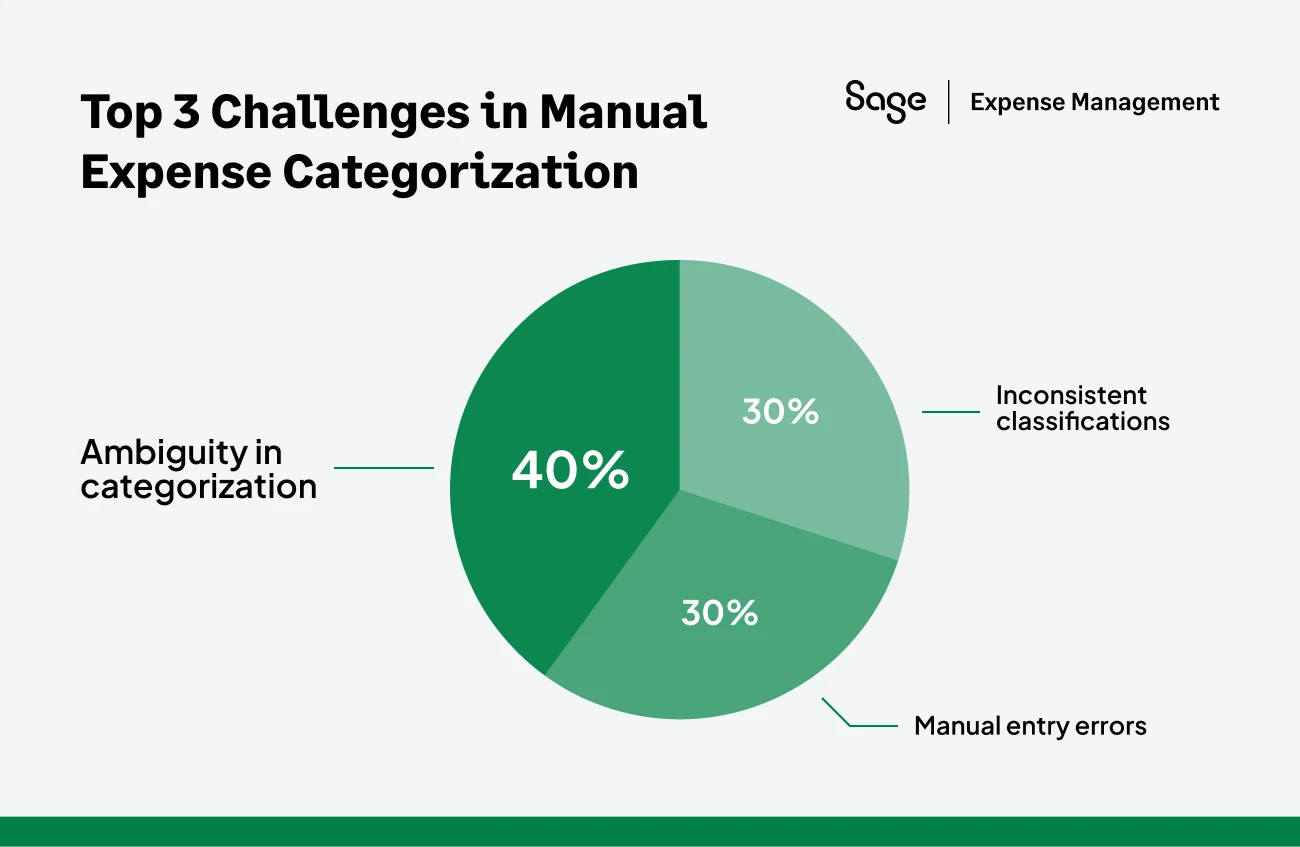
Manually managing business expenses is a tedious and time-consuming process that can cost your business thousands of dollars and countless hours every year. This "dark side" of manual expense management is exactly what a modern finance team is trying to avoid.
The Hidden Costs of Manual Data Entry
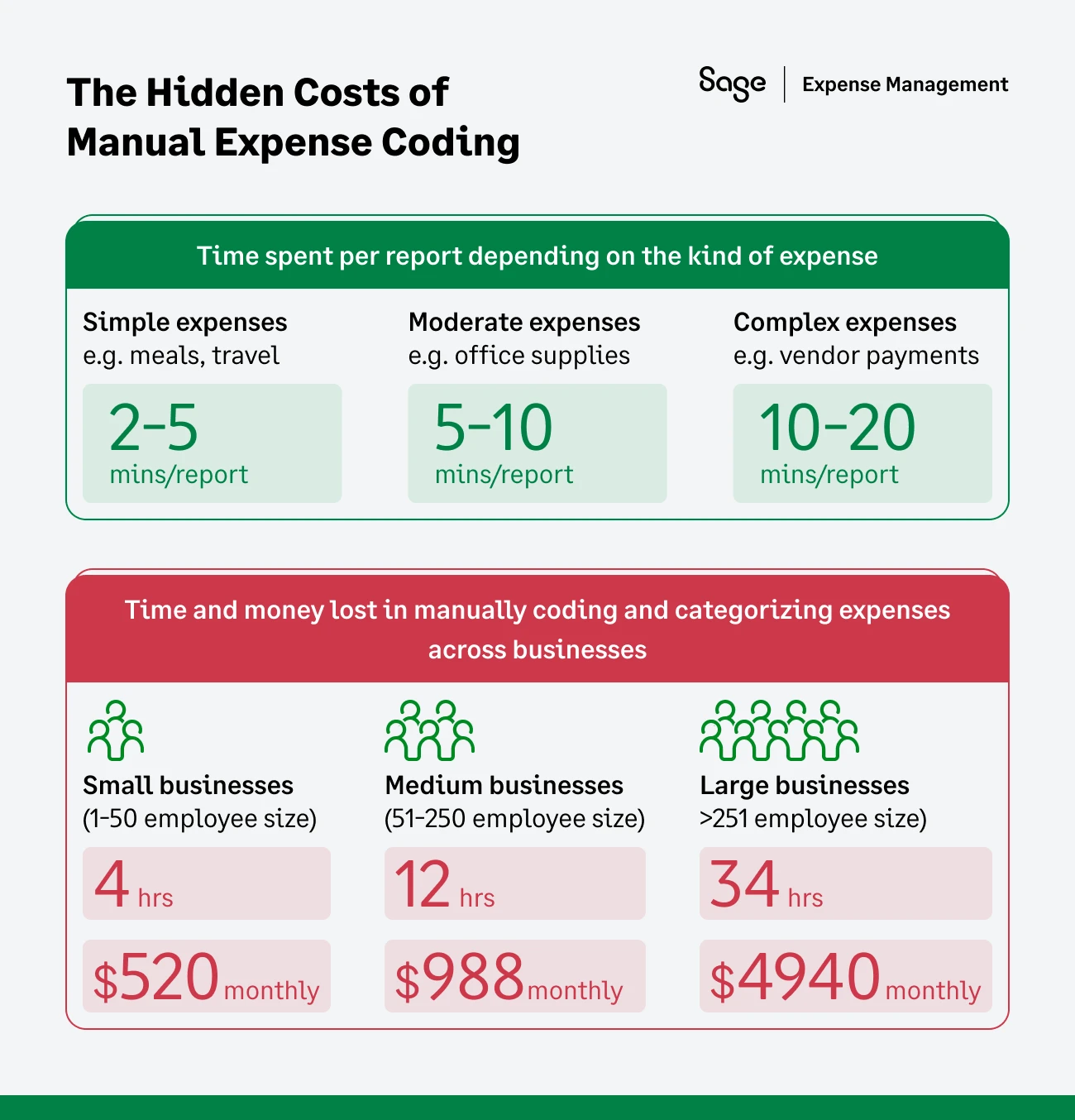
Think about the time your team spends on each expense report. It's not just a few seconds. According to our internal research, a simple expense like a meal or travel can take 2-5 minutes to process manually, while a complex one, such as a reimbursement or vendor payment, can take 10-20 minutes.
When you add up these small increments of time, the costs are staggering. On average, a small business (1-50 employees) loses 4 hours and $520 per month to manual coding alone. For a medium-sized business (51-250 employees), this jumps to 12 hours and nearly $1,000 per month.
The Financial Risk of Errors and Fraud
Manual expense management is a breeding ground for human error and fraudulent claims. From transposing numbers on a receipt to miscategorizing an expense, mistakes are common and can have a significant financial impact. More critically, a lack of oversight opens the door to fraud.
Our research shows that companies face a median loss of $140,000 annually from expense fraud. This fraud takes many forms:
- Expense inflation: Employees padding a receipt, which accounts for 25-50% of fraudulent claims.
- Personal use: Using company funds for personal reasons, making up 15-30% of fraudulent claims.
- Duplicate submissions: Submitting the same receipt multiple times is a common issue in 10-20% of cases.
- Mileage falsification: Overstating mileage, which accounts for 5-15% of claims.
The Headache of Lost Productivity
The "receipt chase" is the bane of every financial controller's existence. Employees are busy with their primary roles and are not accountants, so collecting receipts often feels like "pulling teeth". This endless back-and-forth delays month-end close, reduces employee productivity, and makes audits a nightmare as you scramble to organize "shoeboxes full of fading paper".
An inefficient process not only hurts the bottom line but also damages morale and creates a massive administrative burden for the finance team.
How Sage Expense Management (formerly Fyle) Can Help Categorize Business Expenses
Sage Expense Management is an AI-powered expense management platform that streamlines your entire expense process. It’s designed to address the exact pain points you face, from receipt chasing to manual coding.
Here’s how Sage Expense Management automates your expense categorization and helps you stay audit-ready:
Your Receipts Come to You

Sage Expense Management helps you collect receipts in < 30 mins. Employees can submit receipts via text, email, Slack, or our mobile app.
It also directly integrates with business credit cards to send an instant text notification when an employee swipes their card, prompting them to submit the receipt immediately.
This means finance teams don’t need to spend valuable time manually reconciling expenses and chasing down missing receipts.
Automated Expense Coding
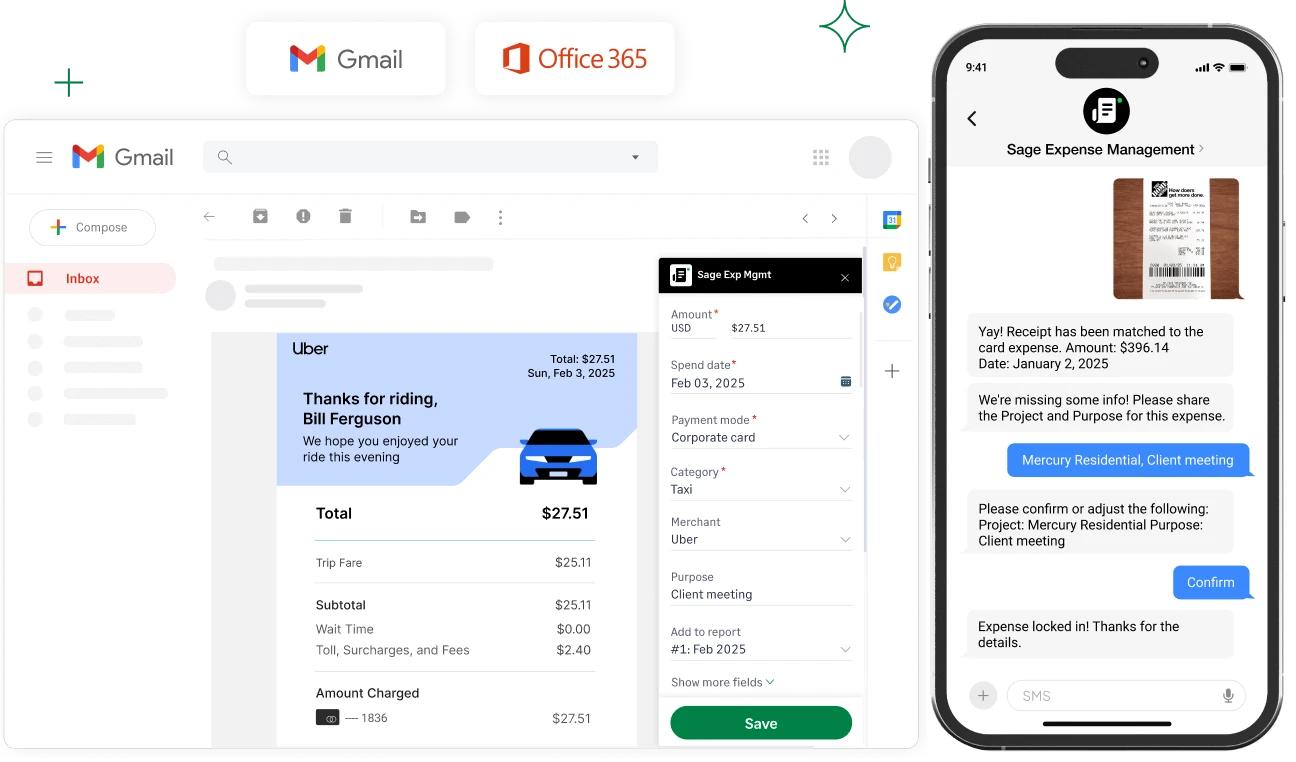
Sage Expense Management AI automatically extracts and codes expense data from receipts, using merchant-based rules and conversational AI to create an expense and pre-fill the amount, currency, date, and merchant name.
With the availability of the Merchant Category Code, the category also gets auto-filled. To automatically assign merchant categories, simply pre-define merchant-based expense rules in Sage Expense Management.
What are Merchant-Based Expense Rules, and How do they Work?
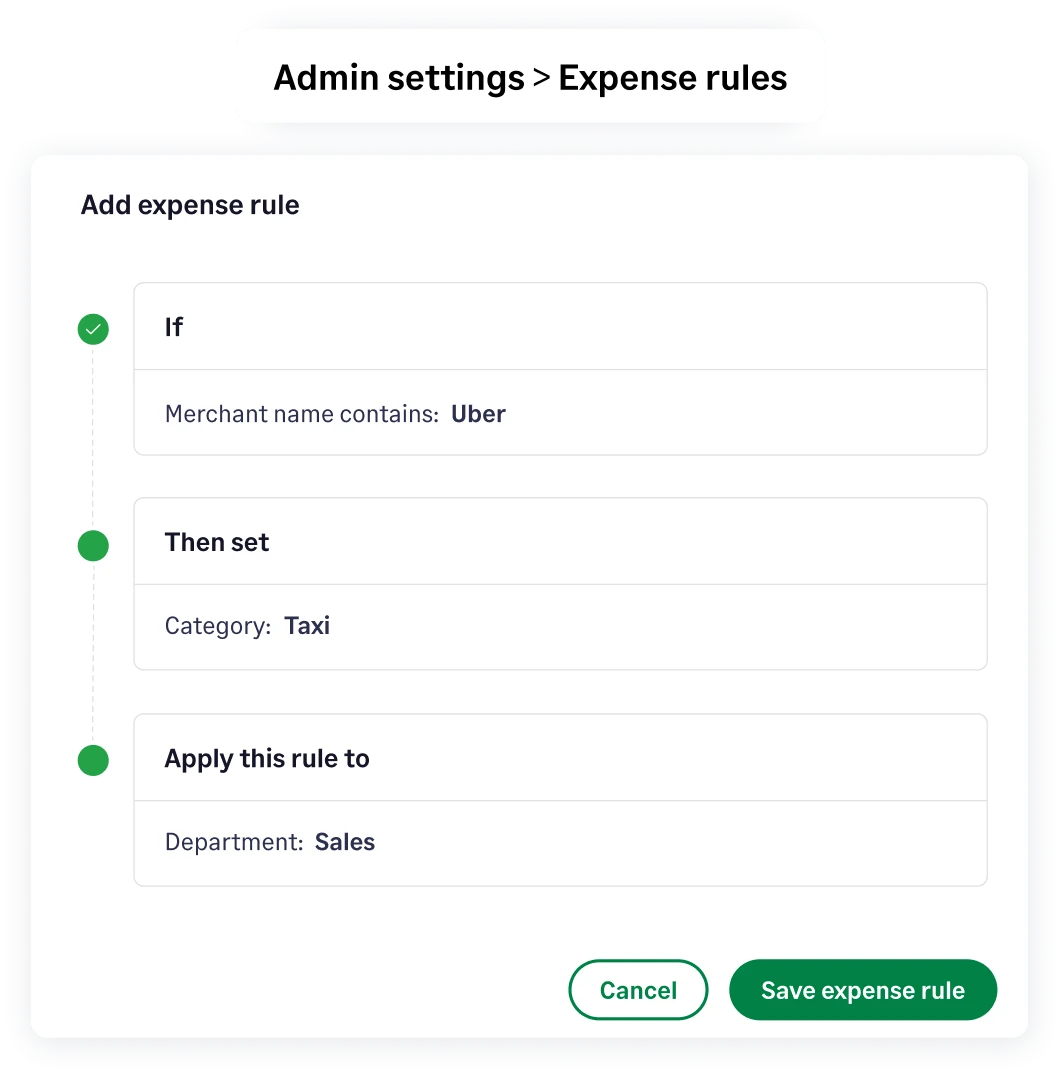
If merchant-based expense rules are enabled in Sage Expense Management, expense fields like Category, Project, Purpose, Department, Location, or Custom fields will be filled automatically based on the Merchant identified from the card transaction or receipt.

If Merchant is Uber, set Merchant to 'Uber Technologies,' Project to 'Project 1, ' Category to 'Taxi,' and Purpose to 'Travel to client's location.
You can also apply these rules to specific departments or projects to ensure consistent and accurate categorization every time. These rules help automate repetitive tasks and save your finance team valuable time.
Stay Audit-Ready
For a business expense to be deductible, you must be able to prove it with adequate records. Sage Expense Management stores all receipts digitally in one secure, searchable location, complete with a clear audit trail that simplifies compliance checks and makes pulling documentation for audits quick and painless. This centralized, digital repository ensures you meet the IRS's record-keeping requirements and are always prepared for an audit.
{{expense-coding-ai="/cta-banners"}}
FAQs Around Business Expense Categories
What can be Written Off as a Business Expense?
Any expense that counts as ordinary and necessary to conduct business can be deducted as a business expense.
What Can’t Be Written Off as a Business Expense?
Personal expenses, entertainment expenses, fines or penalties paid to a government for violating a law, illegal payments, and dues to various country clubs cannot be written off.
Can You Deduct Job Expenses?
Generally, you cannot deduct job-related expenses. However, if you have reimbursed your workers for relocation or other costs under an accountable plan, you can deduct the reimbursement as a business expense.
Is There a Small Business Start-Up Costs Tax Deduction?
Yes. You can elect to deduct up to $5,000 of business startup costs and an additional $5,000 of organizational costs in the year your business begins. Any costs exceeding $50,000 reduce the deduction.
Can I take The Standard Deduction and still Deduct Business Expenses?
Yes. Business expenses are deducted from your gross income to determine your adjusted gross income, while the standard deduction (or itemized deductions) is taken from your adjusted gross income. Therefore, you can take the standard deduction and still deduct your business expenses.
What are the Different Types Of Expenses?
There are three different types of expenses: fixed, variable, and periodic .
- Fixed expenses: Expenses that don’t change, such as rent or mortgage payments.
- Variable expenses: Expenses that change from month to month, like utilities.
- Periodic expenses: Expenses that happen occasionally, like for emergencies or business travel.
What Kind of Records Do I Need to Keep for Each Expense?
The IRS requires that you keep "adequate records" to substantiate all deductions. This includes receipts, invoices, and canceled checks. A receipt should clearly show the vendor's name, the date of purchase, a description of the item, and the amount paid. For car expenses, you need to keep a log of mileage, dates, and business purpose.
How Long do I Need To Keep my Tax Records?
The general rule is to keep records for 3 years from the date you filed the original return. However, you must keep records for 7 years if you claim a bad debt deduction or a loss from worthless securities. Records related to property should be kept indefinitely, or at least until the period of limitations expires for the year in which you sell or dispose of the property.
Can I Deduct Car Expenses If My Employer Reimburses Me?
You can only deduct expenses that you are not reimbursed for. If your employer's reimbursement plan is an accountable plan, the reimbursements are not considered taxable income, and you do not deduct the expense. If it is a non-accountable plan, the reimbursement is included in your taxable wages (Form W-2), and you may be able to claim a deduction for the expense as an itemized deduction.



.webp)
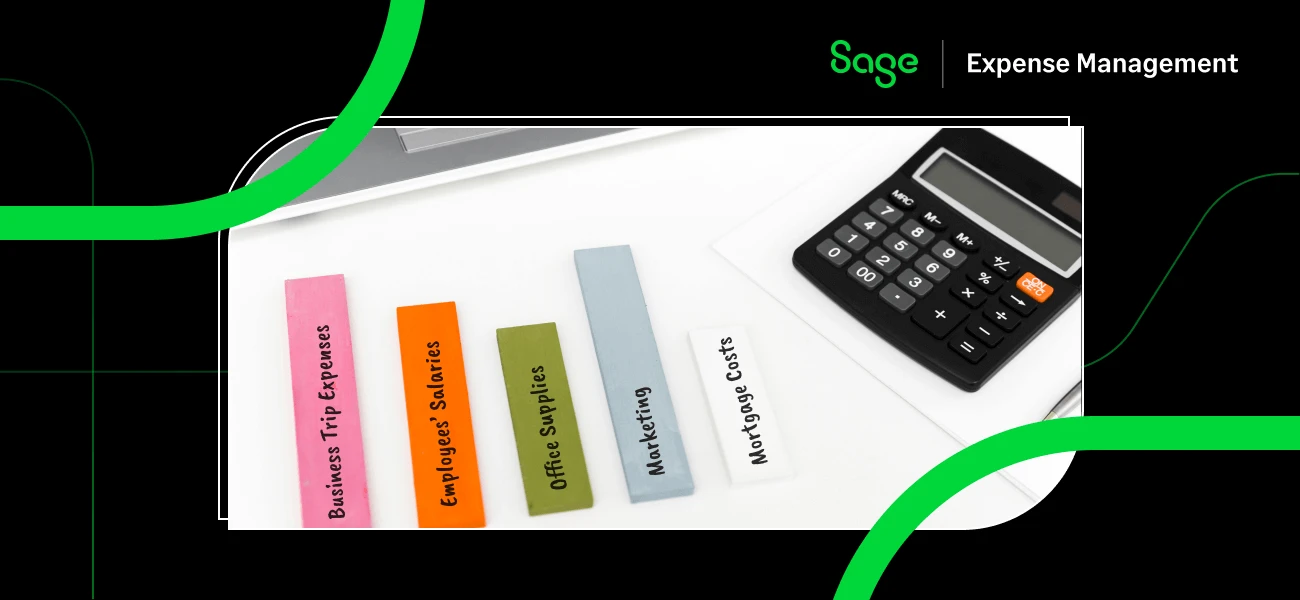
.webp)















